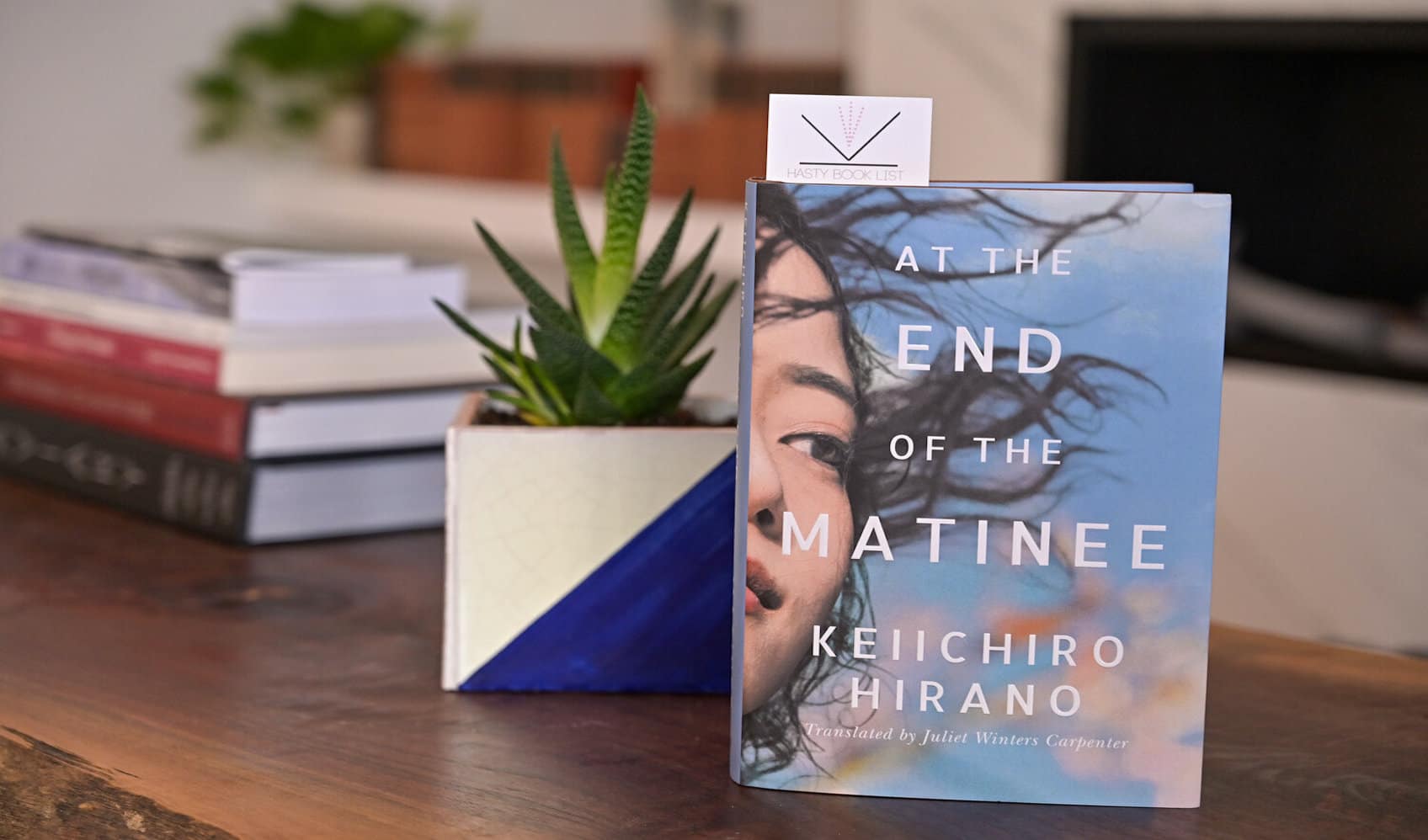ELLA KELLEHER WRITES (latest in her review series of great new books from Japan) – Many are already well aware of love’s fragility, but At the End of the Matinee (2021) proves that love can also be incredibly resilient. Based on a true story, Keiichiro Hirano’s book depicts an agonizing and suspenseful journey of two soulmates – a man and woman whose lives intersect at the exact time they were fated to meet, only to then be torn apart by personal trauma and deception.
The literary and social merit of At the End of the Matinee emanates from how “internationalist” the book is at its core. Hirano moves away from the Sinocentrism featured in many classical Japanese novels. Instead, Hirano’s multiracial and multicultural characters exist in a world far greater than their respective home countries. Women characters such as Yoko are also depicted as complex, independent, and intrinsically talented. For many readers, this is a far cry from other Japanese authors who have been heavily criticized for sexualizing femininity and for simplifying women characters in general. Hirano and authors like him are paving the way for more diverse and socially aware Japanese works to come.
Hirano acts as a perfect medium between the artistic and surreal often featured in the works of popular Japanese authors such as Haruki Murakami, and the classical Western literary style many are already familiar with. Hirano manages to diversify and modernize his stories while maintaining calculated, sophisticated intellectualism that lures the reader with its entertaining and witty writing. At the End of the Matinee remains one of the best international romance-drama novels to come out this year, offering its readers much wisdom in the way of love, resilience, and self-reflection.

At the End of the Matinee is Keiichiro Hirano’s second novel to be translated into English by the gifted, Juliet Winters Carpenter. Hirano’s recent release follows his highly successful 2020 book, A Man. At the End of the Matinee has dually been the subject of much praise both in and outside of Hirano’s native Japan. However, unlike the surrealist plot in A Man, At the End of the Matinee features a refreshingly simplistic and age-old storyline: boy meets girl, falls in love, loses girl, and finds girl again.
Love at first sight. An invisible force so powerful that it can alter the destinies of the people who are ensnared by its magnetic euphoria, so much so that they will do anything and everything to maintain the connection. This is the initial story of classical guitarist, Satoshi Makino, and international journalist, Yoko Komine. Makino is a sensitive, genius-level musician who Yoko worships from a young age. When the two first meet, they speak extensively about music, films, poetry, and the philosophy of memory. Makino is hypnotized by Yoko’s peculiar beauty, describing her smile as “giving her the air of a mischief-loving boy.” During their first conversation, Makino hauntingly tells Yoko that “people think that only the future can be changed, but in fact, the future is continually changing the past. The past can and does change. It’s exquisitely sensitive and delicately balanced.” The weight of Makino’s words spreads throughout the novel, like cracks in a sheet of ice.
Despite the gravity of their shared connection, Hirano makes sure to include many obstacles in the way of the pair’s happiness. Firstly, Makino finds out during their initial encounter that Yoko is engaged to an American named Richard – a man who is determined to possess Yoko and make sure that Makino cannot have her. For Richard, Yoko is more of a trophy than a partner. Later, when Makino and Yoko decide to declare their affection for one another, disruptions get in the way of them meeting in person anew. Paris, Tokyo, Baghdad – the two are almost always geographically separated during their courtship, adding steadily to their insecurity over the durability of their love.
Yoko and Makino’s feelings for one another is bound together and strengthened by classical guitar, especially when Yoko gets stationed in Baghdad, Iraq during a reporting mission. She experiences immense trauma after witnessing a suicide bombing (which she narrowly survived), shootings, and threats of violence. During the most tumultuous time of her life, Yoko finds solace in Makino’s rendition of the theme song of her estranged Yugoslavian father’s most famous war film, Coins of Happiness. Makino does not just remind Yoko of the peace and calm she feels in his company while living in a grief-stricken environment, he also fills a void that her own father left behind years ago.
Jealously is the couple’s biggest adversary. Makino’s personal assistant, a hardworking and obsessive woman named Sanae Mitani, is revealed to be desperately infatuated with Makino. Sanae notices that ever since Makino began his relationship with Yoko, growing ever more in love, his musical talent and abilities have deteriorated. He faltered on stage, ended a concert early, and lost his magical “touch.” Sanae reasons that this must be the fault of Yoko. With this deduction and her own obsession in mind, Sanae decides to sabotage Makino and Yoko’s relationship in one fatal moment that permanently alters the fate of the two lovers.
Yoko, devastated and confused, refuses to speak to Makino for several years afterward. Coming back to Makino’s point about the past and memory, Yoko realizes that “losing [Makino] meant losing that other Yoko Komine, someone who now would exist only in memory.” This makes the reader stop and question how much the people we surround ourselves with shape who we are. Yoko’s depressing realization only heightens the despair felt not just by her, but also by the reader who now is left wondering how many other versions of themselves they lost over the course of their life.
Several years later, Yoko is a divorcée and Makino is contently married to Sanae and expects his first child, a daughter named Yuki. Shortly after the devastating 2011 Tōhoku earthquake and tsunami, Makino decides to throw a fundraiser concert after a year-long illness-related hiatus from music. Yoko hears of his comeback show, purchases a ticket, and decides to discretely watch from the very back row of the concert hall – unaware that Makino spotted her right away.
After the earthquake, Japan adopted the kanji 絆 to represent the year 2011. Kizuna (絆) or “human bonds” took on a “special meaning in the face of devastating loss,” not just for the Japanese population affected by the national tragedy, but also for Makino and Yoko whose lives were ripped away from each other. Do the long-lost lovers finally reconcile with one another? Are they ever aware of Sanae’s lie that got in the way of their engagement? Do the events of the future truly, in fact, change the devastation of the past? I leave this up to you, the reader, to find out.

Ella Kelleher is the book review editor and a contributing staff writer for Asia Media International, and a recent graduate of LMU. She studied English with a concentration in multi-ethnic literature.


This review genuinely brought tears to my eyes, I haven’t been able to stop crying out of sheer exciting plz send help